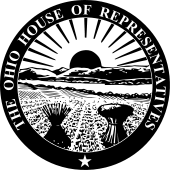Kathleen Clyde
| Kathleen Clyde | |
|---|---|
| Member of the Ohio House of Representatives from the 75th district | |
|
Assumed office January 3, 2011 | |
| Preceded by | Kathleen Chandler |
| Personal details | |
| Born |
September 20, 1982 Garrettsville, Ohio, U.S. |
| Political party | Democratic |
| Residence | Kent, Ohio, U.S. |
| Alma mater | Wesleyan University, Ohio State University |
| Profession | Attorney |
| Religion | Christian |
Kathleen Clyde (born September 20, 1982) is a member of the Ohio House of Representatives, serving from the 75th District since 2011.
Career
Clyde is originally from Garrettsville, Ohio. She was the valedictorian of her class at James A. Garfield High School.[1] After graduation from the Michael E. Moritz College of Law at Ohio State University, where she served as an editor of the law review, Clyde served as Speaker of the House Armond Budish's deputy legal counsel.[2] She also has worked in the Secretary of State's Office and the Ohio Senate. Clyde is a former president of the Public Interest Law Foundation.[3]
Ohio House of Representatives
When incumbent Democrat Kathleen Chandler faced term limits in 2010, Clyde was one of three Democratic challengers who sought to replace Chandler, along with Sean Buchanan and Rick Hawksley.[4] Clyde won the nomination with 56.8% of the electorate.[5] In the general election, Clyde faced three opponents: Republican Roak Zeller, Constitution Party candidate Daniel Cartwright, and Independent Richard Duncan.[6] She defeated all three with 48% of the vote to take the seat.[7]
Clyde was sworn into her first term on January 3, 2011, and is serving on the committees of Agriculture and Natural Resources; Finance and Appropriations and its Higher Education Subcommittee; and State Government and Elections with its Subcommittee on Redistricting.
In 2012, Clyde won reelection with 60.77% of the vote over Republican Nick Skeriotis. She will be representing the 75th District, which replaces the 68th District.
Initiatives and positions
Clyde has been critical of a plan by Ohio Secretary of State Jon Husted to allow voters to register on-line, but not give them as much time to cast absentee ballots. "Voting is already a confusing process, and I think this muddies it even further," said Rep. Clyde, who was director of the Early Voting Center in Franklin County in 2008. "It discourages voting."[8]
References
- ↑ "Kathleen Clyde official website". House.State.OH.US. Retrieved August 8, 2011.
- ↑ "Kathleen Clyde - House District 75". The Ohio House of Representatives. Retrieved June 23, 2014.
- ↑ Kathleen Clyde at the Moritz College of Law
- ↑ Clyde makes bid for Ohio House seat
- ↑ Brunner, Jennifer 2010 primary election results (2010-11-02)
- ↑ House Race in District 68: Heating Up
- ↑ Clyde tapped for Ohio House: Incumbent Dyer loses bid for re-election
- ↑ Marshall, Aaron (2011-03-01). "Secretary of State Husted wants online voter registration, shorter period for absentee voting". The Plain Dealer. Retrieved 2011-02-26.
